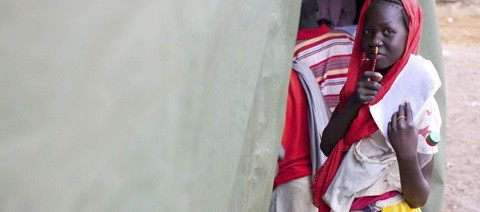
GCED Basic Search Form
Quick Search
현재 위치
뉴스

We must not leave young refugees by the wayside, urged UNESCO and the Office of the United Nations High Commissioner for Refugees (UNHCR) as they pleaded in favour of young refugees’ education during an online debate on how best to provide them with improved learning during and after the pandemic.
“Mobilizing for refugees is extremely urgent at a time when they are particularly vulnerable to the Covid-19 crisis and its aftermath,” said UNESCO Director-General Audrey Azoulay, as she opened the meeting. “The Covid-19 crisis is jeopardizing everything we have done for the education of refugees and migrants, their integration and chances of self-realization. We must strengthen our action in favour of the most vulnerable in order to guarantee them this fundamental right.”
Canada's minister of international development, Karina Gould, who told the story of her Czech grandparents who became refugees after they fled former Czechoslovakia during World War II, put forward the necessity of “low tech solutions,” considering the digital and technological divide, and lack of communication infrastructures in many countries. Cameroon’s minister of Secondary Education, Pauline Nalova Lyonga Egbe, gave the example of mobile phones which are used by most of the population and which can be used as a cheap medium for remote education.
The roundtable was also attended by two young refugee students from Rwanda and Mali now living in Kenya and Burkina Faso, a high ranking official in Kenya primary education and a member of the Pakistan National Assembly in charge of education and professional training, and representatives of the Global Coalition for Education established under the auspices of UNESCO.
The UNHCR Special Envoy, actress Angelina Jolie, a long-time advocate for displaced persons, introduced the discussion and summarized its highlights. United Kingdom's Under-Secretary for Foreign Affairs, Baroness Sugg stressed that “education must be prioritized in the global recovery from coronavirus. This epidemic is not just a health crisis, it is an education crisis, especially for refugee children. Without school and an education, they will be unable to rebuild their lives and achieve their full potential.” She announced an extra 5.3 million pounds sterling to be given to UNHCR by the British Government.
Concluding the discussion, The High Commissioner for Refugees, Filippo Grandi, warned “the bigger picture remained very grim because of the upcoming impact of the economic crisis on long term international assistance for education.” He stressed that 12% of education activity is supported by international aid. As between 40 and 60 million children might fall into poverty, he added, “we must include those who are among the most excluded, the people on the move.”
UNESCO has warned the pandemic risked jeopardizing the progress made in education in recent years, especially for young girls. UNHCR estimates at least 20% of whom are at risk of not resuming their studies interrupted during school closures. However, a number of governments are planning to include refugees in post-pandemic response measures, such as distance education, in line with their commitments under the Global Compact on Refugees.
The event was co-sponsored by Canada, the United Kingdom and the global Education Cannot Wait fund, which channelled its second COVID emergency allocation to refugees.
URL:
https://en.unesco.org/news/unesco-and-unhcr-call-inclusion-refugees-post-covid-19-education-effort
